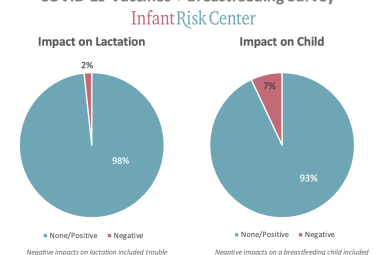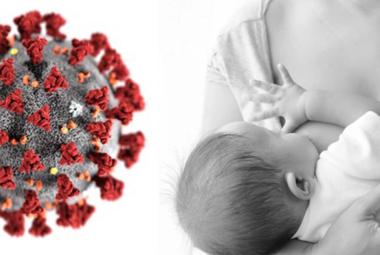Cariprazine Induced Adverse Effects in Breastfed Infants?
Cariprazine is a newer antipsychotic drug often used for the treatment of bipolar mania and schizophrenia. It has two active metabolites desmethyl cariprazine (DCAR) and didesmethyl cariprazine (DDCAR) which are equipotent to cariprazine with much longer half-lives, requiring up to 4-6 weeks to attain steady state concentrations. Cariprazine acts as a partial agonist at the dopamine D3 and D2 receptors with high binding affinity. While there are no data on its transmission into human milk, its kinetics suggest that milk levels might be high. Elevated milk levels in combination with extended metabolism may result in significant drug accumulation in a breastfeeding infant. The InfantRisk Center recommends that this medication be avoided in breastfeeding women if possible. Possible adverse effects in the infants could include extrapyramidal and/or withdrawal symptoms, including agitation, hypertonia, hypotonia, tremor, somnolence, respiratory distress and feeding disorders.
Cariprazine kinetics include:
Protein binding: 91%-97%
Time to max level: 3-6 hours
Molecular weight: 427.41
Oral bioavailability: High
pKa: 7.91 and 15.48
Half-life: up to 3 weeks for DDCAR (metabolite)
The InfantRisk Center has recently been made aware of a possible case of infant tardive dyskinesia secondary to breastfeeding from a mother taking cariprazine. Tardive dyskinesia is a condition that affects the nervous system causing repetitive, involuntary movements including blinking, grimacing or lip smacking. The mother reported resolution of symptoms in the infant (<1 month old) a week after breastmilk was withheld. It is not known if she took cariprazine during pregnancy. The mother has since been lost to follow-up, so our information is limited.
If you are aware of any adverse effects of a breastfed infant due to maternal cariprazine use, please contact the InfantRisk Center at InfantRisk@ttuhsc.edu. We also recommend you report the event to the FDA Adverse Event Reporting System, MedWatch, using the reaction term “Exposure Via Breast Milk”.
Kaytlin Krutsch, PharmD, MBA, BCPS






